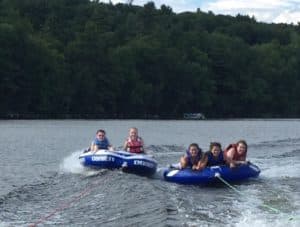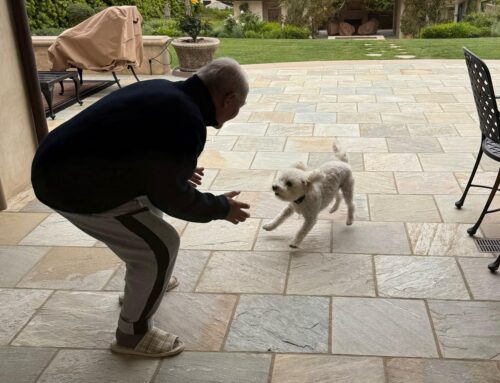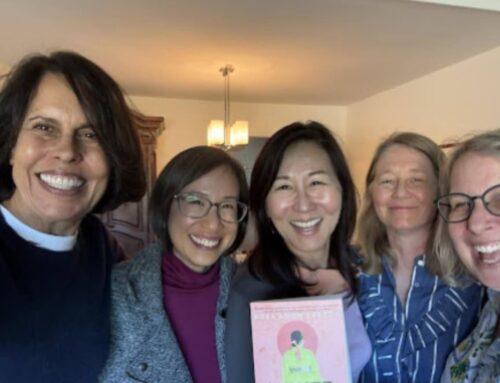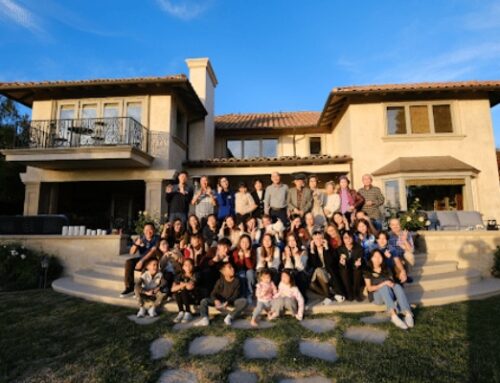Spring is in the air, and summer is not too far off. As I think about making summer plans for our family, I remember an experience I had with my son last summer that rocked my world. I’ve been thinking about it ever since, and I thought I would share it with you here.
The Incident
The boat gained speed dragging five screaming cousins in innertubes close behind. Two children sat upright in one double tube, and three laid down on their stomachs on one huge tube gripping tightly onto multiple handles. The boat turned left, then right, tossing the tubes up and down on the wake and spinning the “laying down” tube so far out that the tubers are hurled off in a synchronized motion. Laughter and shrieks echoed across the lake as the tubers and the boatriders alike enjoyed the fun.
 Watching the happy tubers from the boat, I suddenly wanted to cry. It wasn’t the choppy ride that made me feel awful. It was the bittersweet memory of this activity that I had shared with my 19 year-old son for as long as I could remember. My recently-turned-adult son was not here for the first time in his life. My son was launching into a different kind of experience that had nothing to do with catapulting into a warm lake in Maine. He was launching into adulthood.
Watching the happy tubers from the boat, I suddenly wanted to cry. It wasn’t the choppy ride that made me feel awful. It was the bittersweet memory of this activity that I had shared with my 19 year-old son for as long as I could remember. My recently-turned-adult son was not here for the first time in his life. My son was launching into a different kind of experience that had nothing to do with catapulting into a warm lake in Maine. He was launching into adulthood.
I couldn’t believe it when my son told me he didn’t want to go to Maine with us this past summer. “What?” I said, incredulous that he would miss out on the tubing, Grandma’s cookies, Gifford’s ice cream and mini-golf. “I don’t care,” was his response. Coming to Maine was his favorite thing to do and the only family vacation he really looked forward to. It was the annual summer trek to an idyllic lake in Maine that my husband and his family have been making for generations. My California children always enjoyed the chance to get together with their East Coast cousins, grandparents, aunts and uncles for a couple of weeks every summer ever since they were born.
But this past summer was different. My son turned 19. He finished his first year of college. He went abroad for 10 days on an international business program. He worked all summer at an internship.
We also got into lots of arguments over how much independence he would have at home now that it was his first summer back from college. He and I disagreed about the amount of time he should be spending with the family and what he should be doing with us. I got so angry that I kicked my son out of the house. He didn’t come home for three days. I was worried sick and couldn’t sleep. When he came back, he told me he didn’t want to go to Maine. He was furious with me and wanted to make his own decisions, even when it came to family vacations. It was a really difficult time, but I learned a lot.
I learned that I need to let go, but that it’s a difficult process for me. I found myself falling into old patterns and wanting to be a central part of my son’s life. I recognized that my son has a biological need to differentiate himself from me, but I couldn’t seem to separate myself from him. I sometimes felt a sense of loss so great that it consumed me whole. Was this normal?
Seeking Help
I decided to see a therapist to help me understand what was happening to me personally and as a mother. I needed advice on how to navigate this phase of my life and build a better relationship with my son. It has been a transformative experience and I am glad I sought help. I also asked my friend and family therapist, Dr. Paige Asawa, for words of wisdom. She gave me lots of great insights and told me to look up “family life cycle — launching phase.”
In psychology, the launching phase is when a family is in the process of having children depart from the parental home. Very little has been written about it, however, as compared to earlier parenting stages. What happens during this period? What will happen to my relationship with my children? What I discovered, to my surprise, is that this is one of the most difficult transitions in a family’s life cycle.
I learned that when children enter early adulthood, they will separate themselves emotionally, socially and financially from their parents. Parents also adjust and focus more on their relationship with each other and possibly career goals. It is a time that can be both positive and negative, and stress can be felt by all parties. Family members can support one another in this process, or can fail each other in painful ways.
One way young adults can steer through this process is to become autonomous while maintaining connections with their family, despite what they think their family member’s shortcomings may be. The family members may or may not change, but that’s up to them and it shouldn’t matter to young adults as they try to separate. The young adults’ goal is to develop an adult relationship with their family and establish their role in it, regardless of what anyone else does.
What Parents Can Do
Parents should understand that the launching period is a normal life stage. As family size decreases, activities and interactions have to be modified if the family is to remain intact. Parents can manage this process by assessing whether to provide more support or more freedom to a young adult. It is a complex period, and parents are often filled with a mixture of feelings, such as sadness and relief, rather than strictly negative or positive emotions. The more we realize the characteristics of this phase, the better off we will be as parents during this period.
I am facing the launching phase with my daughter now as she is a junior in high school and turns 18 this year. We did a week of college tours with her this past summer. When she leaves home for college, we will enter the “empty nest phase,” which is the phase of the family life cycle when all the children are grown up and are no longer living at home. What is going to happen when my daughter launches? I’m sure she will want to assert her independence and I will want to hold on. But hopefully I have grown wiser from my mistakes and will be able to navigate this phase a little better the second time around.
As I learn more about the different phases of the family life cycle, I realize that I must change the way I view my relationship with my children. I must accept that my children are becoming adults, and learn when to stay out of their way, and when to support them. I like to think that we are launching into a new phase of our family life cycle, but that we will somehow all land safely into that warm lake in Maine this summer!







Thank you for being so brave and sharing your story. You help many people when you do. Glad to count you among my friends.
It’s taken me a while to put myself “out there.” It still feels very vulnerable. Thank you for supporting me all the way my dear friend!
Thanks. Same here. After internal exploration and prayer, I realized I missed “mothering” the most. Once I shared this with the boys, they actually let me “mother” them when they’re home. I’m still letting go and it’s still difficult. I appreciate you sharing this.
.
Thank you Elyse. It’s nice to know we are on the same page. It’s true that sharing our feelings with our children is important. They understand where you are coming from more and can be more understanding. It’s a mutual give and take. A friend referenced Push Me Pull You, the Dr. Doolittle character, to describe this phase. It’s so true!. I appreciate your thoughts!
Hi Rosa, I somehow missed this earlier this year. This is so relevant and I can relate. Thank you for sharing your experience. I think we can all learn from each other.
I’m reading the book “the launching years” by Dr. Laura S. Kastner
Thank you Bettina. I’d love to hear what you think about the launching years book. You are right that we can all help each other through this process!